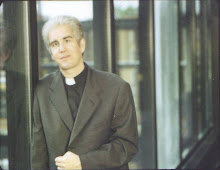I am glad that Luther’s Small Catechism is included in the assembly edition of Evangelical Lutheran Worship and the pew edition of Lutheran Service Book. More than a handy resource for inviting God’s people to rediscover this Lutheran treasure, the inclusion of the Small Catechism in the hymnal invites preachers to read it in new ways. Though I keep the Book of Concord in ready reach, reading the Small Catechism from that book inspires an attitude of study. Reflecting on the Small Catechism from the hymnal affords both a certain freedom when considering the catechism and a disposition of prayer. Lately, I have been approaching the catechism as a “preaching text”–not a text for preaching but a text about preaching. I’ve been exploring what insights Luther’s Small Catechism gives about preaching. Permit me to share just a few.
For starters, Luther’s treatment of the Ten Commandments always gives me a headache as I am confronted by the absolute impossibility of keeping the law. Fear, love, and trust God above all things? How do I even know when I am loving my wife and daughter ahead of God so that I can not do that? In preaching, I need to hear and receive grace; I certainly need to preach it. “Do not despise preaching or God’s word, but instead keep that word holy and gladly hear and learn it.” I confess that I have weeks when I despise preaching and am not too pleased with the appointed portion of God’s Word. On those weeks, Luther points the preacher beyond the task and the pericope to the the preacher’s relationship with God. Perhaps the preacher is not fearing, loving, and trusting God above all things.
Luther also reminds me that God’s Word is bigger than I think and, often, bigger than I am comfortable with. The prohibition against murder calls us to help and support our neighbors in all of life’s needs. The commandment not to steal includes the expectation that we help our neighbors to protect and improve their property and income. And, according to the eighth commandment, we are to come to our neighbors’ defense, speak well of them, and interpret everything they do in the best possible light. As a preacher, these explanations remind me that, whenver I think I know what a passage of Scripture means and stop listening to it, I sell God’s Word short.
I’ve begun including Luther’s explanation of the third article of the Creed in one of my preaching lectures. I hear lots of sermons that tell me what I should, ought, and must do. I wonder how I am supposed to do all the stuff the preacher tells me to do when “by my own understanding or strength I cannot believe in Jesus Christ my Lord or come to him.” Far better than telling people what they should, ought, and must do, preachers proclaim what God is doing and what people can do because of the Holy Spirit that calls them through the gospel and enlightens them with the Spirit’s gifts.
Turning to the Lord’s Prayer, I find Luther inadequate when it comes to daily bread. I add God’s Word to Luther’s list. Recalling Jesus’ words, “It is written, ‘One does not live by bread alone, but by every word that comes from the mouth of God’” (Mt 4:4), this petition helps me to receive God’s Word with thanksgiving. Moreover, this petition keeps me humble and realistic: sermons are daily bread and not eternal utterances that will change the world. Change comes through a steady diet of the daily bread of God’s Word.
Baptism reminds me of the power of God’s Word. God’s Word in water forgives sins, redeems from death and the devil, and gives eternal salvation. My favorite verse in Scripture reminds me that “we proclaim Christ crucified, a stumbling block to Jews and foolishness to Gentiles, but to those who are the called, both Jews and Greeks, Christ the power of God and the wisdom of God” (1Co 1:23-24). To preach the Gospel is powerful stuff.
Holy Communion challenges me. More than comforting me that the grace of the table will compensate for a lack of grace in the sermon, the table requires me as preacher to move toward saying in words what the bread and cup will say–Christ given and shed for you.
Mostly, the Small Catechism assures me as a preacher who, first and foremost, is a baptized child of God, that God created, provides for, and protects me; that Jesus Christ redeemed, purchased and freed me; that the Holy Spirit makes me holy and keeps me in the true faith; that I can use God’s very name in every time of need to call on, pray to, praise, and give thanks to God. The list goes one. In preaching, I simply thank and praise, serve and obey the God who loved me first. This is most certainly true.
Sunday, March 9, 2008
Subscribe to:
Post Comments (Atom)

No comments:
Post a Comment